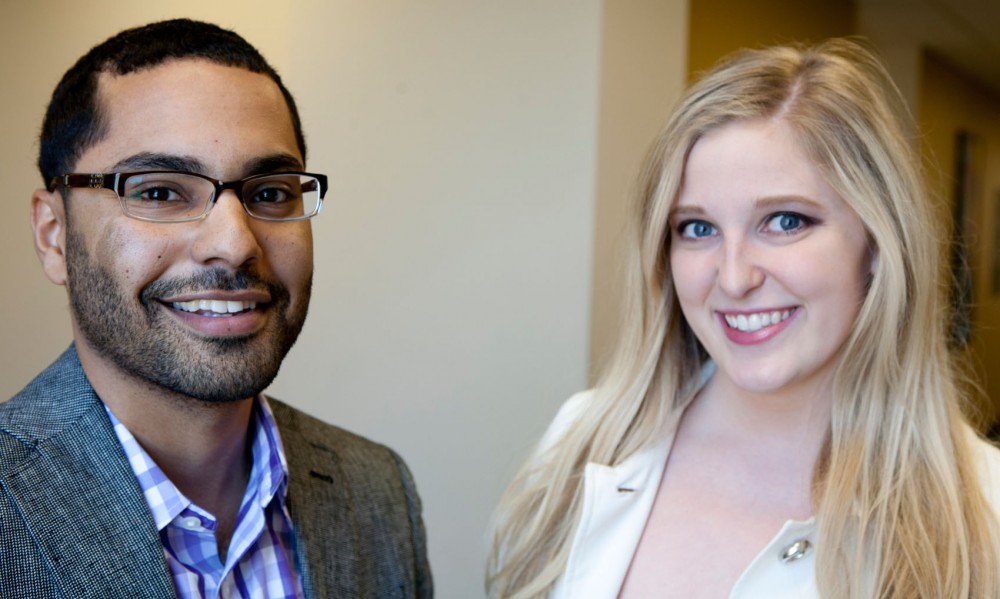Behind the University of Minnesota’s most powerful entity, the Board of Regents, are eight student representatives that try to ensure student voices are heard.
Interviews for four positions for the Twin Cities are being held this week as some of the representatives get ready to pass the torch.
The eight-member representative board is made up of four Twin Cities campus members and one student for each of the satellite campuses: Crookston, Duluth, Rochester and Morris.
At the head of the board is Chair Abdul Omari, the Graduate and Professional Student Assembly representative, and Twin Cities ranking representative for the Minnesota Student Association Chantal Wilson.
Their role is to act as the “middle ground” between regents and students, Omari said. This includes making sure student concerns are pushed up to the board and information is brought back to the students.
“What gets presented to the regents is oftentimes statistics and numbers. Oftentimes they either look really good or really bad,” Omari said. “But the voice that we bring is beyond what’s on paper. We can speak to the actual reality of students.”
While the student representatives have a chance to voice concerns with regents, they do not have a vote.
Omari has held a position on the board since fall 2010, and his term ends this spring. Wilson’s term began in spring 2011 and will also come to a close this May.
Just like the 12-member Board of Regents, student representatives are expected to review docket materials for monthly board meetings and voice their opinions.
When the meeting dockets come out, the representatives hold a monthly meeting to talk about student concerns. This helps ensure that the members are representing the students and not just their own opinions, Wilson said.
She said these meetings are open to the student population in general, though not many have come to their meetings so far. They hope to increase student participation in the future.
Side-by-side with former legislators and business leaders, these undergraduate and graduate students are dispersed throughout the various board committee meetings.
Having meetings before entering committees is especially important when something concerns one of the satellite schools and that representative isn’t present, Wilson said.
Omari said he felt his concerns about the tenure process were taken seriously by the board in a discussion this fall. He told the board that teaching needs to be a more integral part of the tenure process.
“If you get somebody that’s a good teacher in the classroom, it’s an added bonus,” Omari said. “While teaching is included in the tenure process, it’s not always weighed the heaviest from the student perspective.”
At the end of each semester, the student representatives create a report for the board with messages that they feel are important. This year’s report will be about financial literacy — students’ understanding of finances — and community leadership in the classroom.
While the information is presented to the board, just like other discussions that come up at meetings, actions aren’t always taken on the topics.
“Often we find that we present this stuff and it just goes away or it comes back up in two years because it’s still an issue that’s coming up,” Omari said.
Director of the Minnesota Student Legislative Coalition Chris Tastad said that it’s very difficult to make sure that students are heard.
He said that students are often “jockeying” for attention and funds with the University’s focus on research and outreach.
“The problem we see is that this input from students has not increased proportionally to the level of [tuition] burden,” he said.
Tastad brought the idea of mandating two students to sit on the University’s Board of Regents when elected to the state Legislature. Currently, only one of the members has to be a student upon election.
While currently two were elected as students without the proposed mandate, Tastad said that it’s important to codify the concept to make sure students remain a focus of the board in the future.
Tastad said students would be better heard if the student representatives had a vote.
Chair Linda Cohen said although the representatives don’t vote, their voices are important in decision making.
The student representatives made a “real impact” on her realization of how difficult student debt is, she said.
“It brought the point home even more of how important it is to keep tuition as low as we can,” Cohen said.
All four Twin Cities representatives will step down as their term comes to a close this May and four new representatives will be announced May 1.


